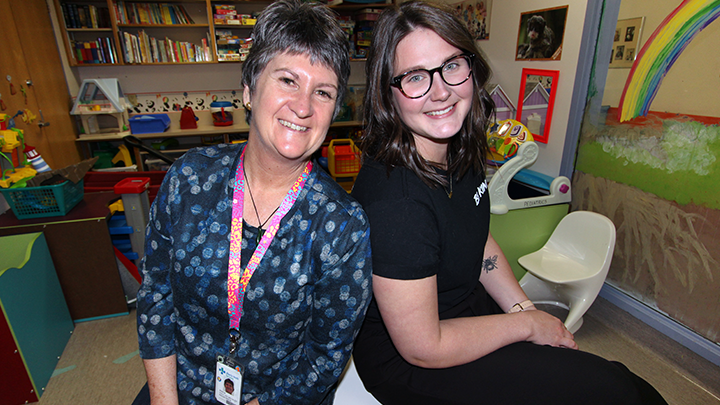
January 14, 2019

Maria Malcolm, left, and Brittany Dyke in the playroom on the pediatric unit.
Story & photo by Sherri Gallant
LETHBRIDGE — As a Child Life Specialist on the pediatric unit at Chinook Regional Hospital, Maria Malcolm is called upon now and then to help children face their mortality. And so it was, one day about 17 years ago, a colleague approached her to see if she might help a little girl whose twin brother had died.
Malcolm agreed to help the child and her family handle their sadness and grief. Word spread about her successful efforts, and one day she was approached by a staff member from Palliative Care.
“She said, ‘we’ve got a Mom who’s dying and can’t bring herself to tell her child, can you help?’ ” recalls Malcolm, who worked with the three-year-old in an age-appropriate way so she would understand what was happening.
One of the techniques she used was to show her how rust had eroded a car in the hospital’s parking lot. Cancer is kind of like that, she explained.
“While I was still working with that case, they came to me and said, ‘we’ve got a seven-year-old and a two-year-old whose mom is dying, could you help them?’ And it just sort of progressed from there to now, 17 years later, and a formal position has been created to run this as an official program.”
To date, Malcolm has worked with 162 families, children aged 2 to 17. In October, she handed the reins to Brittany Dyke, a Child Life Specialist and former student of hers, who had previously volunteered with Malcolm for four years.
“I do love this work,” says Dyke, who has a special interest in play therapy. “It’s because when you have a conversation with a parent, they feel so relieved to know that someone is helping their child. A lot of the clients I’m working with right now are at the end of the grief; the parent has passed away and I’m able to see family come out of the stages of grief, see the surviving parent thrive again and see these kids move forward with their development and experiences.
“It’s one of the only jobs I’ve ever had where I feel appreciated every single day. We deal with really hard things, but every family, every person is grateful. When you work with children you don’t always get that. I love that I’m supporting children and families and that they really feel supported.”
Malcolm has studied how to prepare kids for traumatic events, but the road she embarked on was not paved in the beginning. Finding age-appropriate ways to prepare them was partly instinctual and partly from her experience as a classroom teacher.
“Whether you’re teaching them to read or teaching them to experience grief or prepare for a death, it’s still education,” she says.
“Maybe that’s just the natural teacher in me. Knowing child development — what children understand about death, at what ages. Children don’t understand the finality of death until age 8. But we use the word death. We say that Mommy or Daddy is going to die and is never going to come back. Very plain language and we say it over and over and over again.
“There was a little two-and-a-half-year-old I was working with, and every time I saw her she would grab my face and say, ‘Mommy dead?’. And I would say, ‘yes, Mommy’s dead.’
‘Mommy’s not coming back?’
‘No, Mommy’s not coming back.’
‘OK.’ And then she ran off to play.”
Malcolm developed materials and curriculum and has used visual aids like bread mould and Lego blocks to illustrate cancer. She’s careful to tailor terminology and context so it fits within each family’s belief system.
Using play therapy, art and puppets, she’s able to prepare them for the appearance of tubes, IVs and other things that are likely to happen, thus removing the element of surprise. She also talks with them about their feelings, often working to dismantle a belief held by many children that they’re to blame for their parent’s illness.
The women are mindful of their facial expression and tone of voice as they impart these facts to children.
“I don’t want to upset them too much — it’s just factual,” says Malcolm. “But we both have cried with clients. They start crying and then the tears come yourself. And that’s OK, because it’s OK to cry and it’s OK to be sad. We tell them that their family will cry — it is a sad thing that we’ve been talking about. And there are times that we will laugh, and that’s OK, too.”
While some adults may challenge them about the bluntness of their language, Malcom and Dyke maintain it’s better for children to hear honest words about what’s happening — since their imaginations will only conjure up something worse, if there are blanks left to fill in.
Referrals to the program come from various sources, but most often from nurses in palliative care and social workers. Since Malcolm initially developed the program, related initiatives have taken root. Addiction and Mental Health, for example, has developed child-life supports for children and families who are facing, or who have faced a loss.